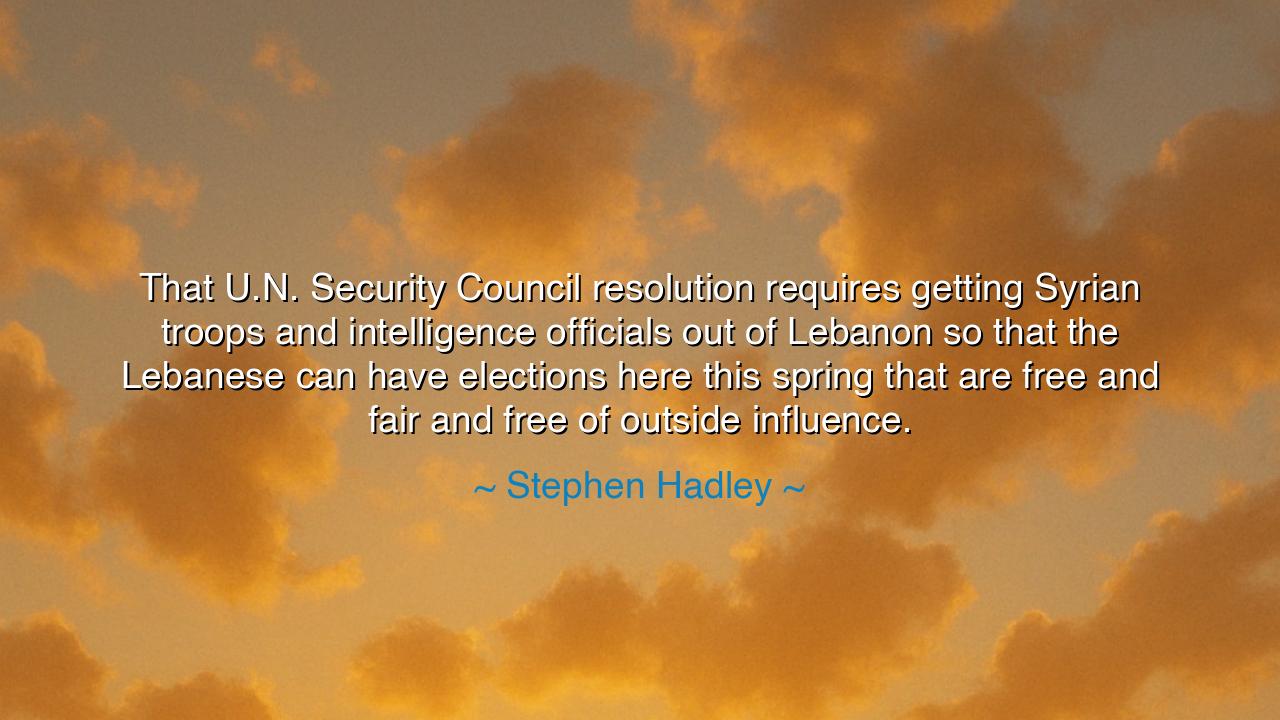
That U.N. Security Council resolution requires getting Syrian
That U.N. Security Council resolution requires getting Syrian troops and intelligence officials out of Lebanon so that the Lebanese can have elections here this spring that are free and fair and free of outside influence.






“That U.N. Security Council resolution requires getting Syrian troops and intelligence officials out of Lebanon so that the Lebanese can have elections here this spring that are free and fair and free of outside influence.” — Stephen Hadley
In these words, Stephen Hadley spoke not merely of politics, but of a timeless yearning that beats within the breast of every nation and every soul — the yearning for freedom. His statement, though grounded in the affairs of states and resolutions, carries the eternal cry of a people desiring to stand upon their own soil, guided by their own will. The Lebanese, weary of being shadowed by another’s hand, sought to reclaim the right that is the birthright of all humankind — the right to self-determination, to justice, and to the sacred dignity of choosing their own destiny.
The U.N. resolution Hadley refers to was born in the early years of this century, amid storms of conflict and whispered alliances. It demanded the withdrawal of Syrian forces from Lebanon — a call not only for soldiers to depart, but for the spirit of domination to loosen its grip. For years, Lebanon’s choices were not its own; its breath, though its own to draw, was measured by others. This resolution, then, was more than law — it was a declaration that nations must be free from the chains of foreign control, that liberty is not a gift bestowed, but a flame rekindled by courage.
Throughout history, the struggle for sovereignty has been the struggle for identity. Think of Greece, once under the heel of mighty Persia, rising in defiance at Marathon and Salamis. The Greeks did not rise for gold nor conquest, but for the right to be governed by their own hands, to speak their own tongue without fear, to call their land their own. Just so did the Lebanese, in the year 2005, march in the streets with hearts ablaze after the death of their former prime minister, Rafik Hariri — a death that pierced the nation and awakened its people. Hundreds of thousands filled Beirut’s squares, demanding that Syria withdraw, that Lebanon’s elections be free and fair, untouched by outside influence. Their unity was their weapon, their voice their sword.
This, then, is the eternal cycle of humankind — the oppressor seeks control, and the oppressed seek freedom. But freedom, once gained, must be guarded with wisdom and virtue, for the world is full of those who would seek to steer others through the hidden hand of influence. The intelligence official and the soldier are but symbols of this — the ever-present temptation of one power to shape another’s fate. Yet even as nations wrestle with these forces, so too must each individual face them within their own soul. For who among us has not felt the weight of another’s will pressing upon our choices? Who has not struggled to find a voice that is truly their own?
To be free is not merely to be unchained; it is to be upright, self-directed, and responsible for one’s choices. The Lebanese, through their struggle, remind us that liberty cannot be granted from without — it must arise from within. The same is true of every human heart. One may be surrounded by peace and still live as a captive if one’s mind is ruled by fear, or one’s will by the desires of others. The first act of freedom, whether for a nation or a soul, is the act of claiming ownership of one’s destiny.
The lesson, then, is clear: freedom and fairness do not descend from heaven like rain — they are wrested from the soil through perseverance and unity. To secure them, one must be vigilant against the subtle invasions of complacency and manipulation. A people, like a person, must guard their independence not only from armies but from influences that creep in unseen — the whispers of doubt, the temptations of ease, the surrender of principle for comfort.
So, my children of the future, remember this: what Hadley spoke of was not only for Lebanon, but for all who would live with integrity and courage. In your homes, your nations, and your hearts, seek to live free and fair, unruled by the shadows of others’ will. Let your choices be your own, your labor your own, your dreams the fruit of your own spirit. For only then — when both nations and individuals rise to stand unbent — will the earth truly know peace.
Thus, the U.N. resolution becomes more than an event in time; it becomes a parable for the ages. It teaches us that to remove the foreign soldier is but the beginning — the greater battle is to remove the foreign spirit from the heart. Let every generation remember this truth: the work of freedom is never finished, for freedom is not a gift that endures — it is a task that must be renewed each day by those who dare to be their own masters.






AAdministratorAdministrator
Welcome, honored guests. Please leave a comment, we will respond soon